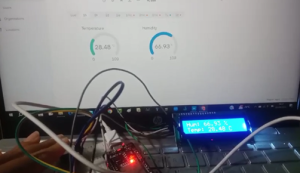


Recent research presented by Fitri Puspasari and her team at SNTT 2024 highlights the significance of temperature and humidity monitoring technology in various applications, ranging from smart home systems to the agricultural sector. The study utilized DHT22 and Si7021 sensors integrated with an ESP32 microcontroller and the Blynk application to develop a real-time monitoring prototype. The research aims to compare the performance of these sensors in terms of response time, measurement accuracy, and energy consumption. With an IoT-based approach, this solution offers a cost-efficient way to meet the growing demand for environmental monitoring.
The test results reveal that the Si7021 outperforms the DHT22 in key aspects, including response time, temperature accuracy, and energy efficiency, making it an ideal choice for applications requiring minimal power consumption. The study concludes that the Si7021 is a more effective and efficient solution for IoT-based monitoring systems. This technology not only enhances environmental control quality but also supports the transition toward sustainable energy. The prototype reflects the immense potential of IoT technologies in creating innovative, sustainable, and energy-efficient monitoring systems, aligning with global efforts to achieve energy efficiency and reduce carbon emissions.

